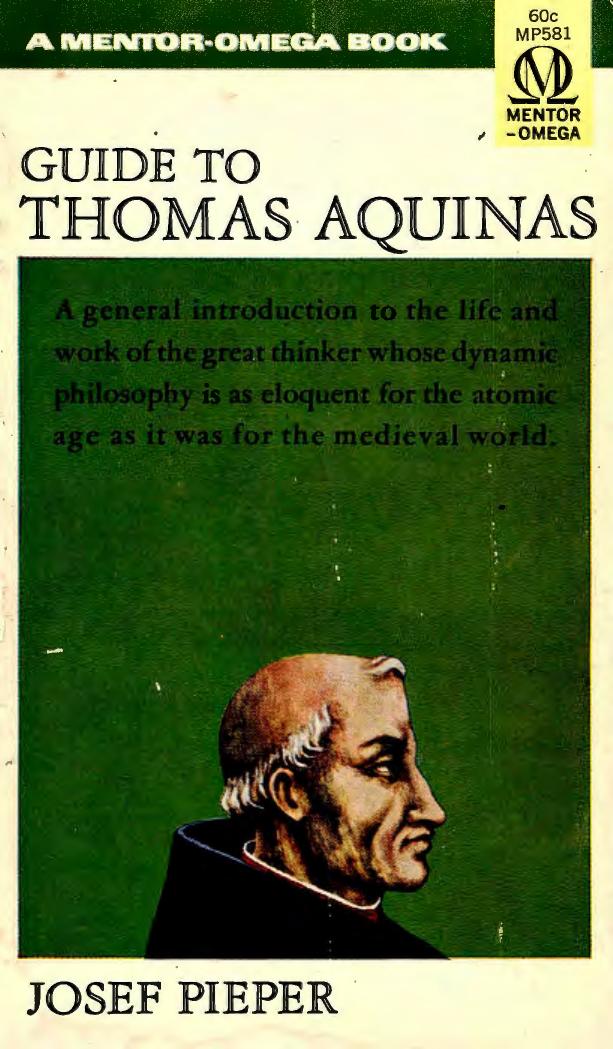Guide to Thomas Aquinas by Josef Pieper

Author:Josef Pieper
Language: eng
Format: mobi, epub, pdf
Tags: Religion, Philosophy, Catholicism, Christianity
ISBN: 9780898703191
Publisher: Ignatius Press
Published: 2011-06-15T00:00:00+00:00
VIII
From the moment that Thomas was officially accepted into the faculty of the University of Paris in 1257, he set himself to his ultimate task, which he was never thereafter to abandon. In spite of the variety of assignments that were heaped upon him, and in spite of the moving around he had to do, at bottom he remained all along and wherever he was, one thing above all: a teacher. As a sideline he also organized a number of faculties, founded schools, drew up and approved curricula. At the chapter-general of the Dominican Order, held in Valenciennes in 1259, Thomas—then a young professor—joined his former master Albertus Magnus on a commission which established a new code on studies for the entire order; among other points it stipulated that every province of the order must create a school of the artes liber ales, with philosophie en tete.1 Nevertheless, Thomas was not really an administrator, but a teacher, and he remained that until the end.
Because of their singularity we shall speak briefly of two assignments which came to Thomas from outside the Dominican Order, and which he took on in addition to his other duties. The first of these concerned the separation of the Eastern Church from Rome. The final break had come in the eleventh century, and thus the separation had lasted for almost two hundred years. The new Eastern Roman Emperor, Michael Palaeologus, desired reunification. Although the Emperor was motivated chiefly by political reasons, Pope Urban IV, who had formerly been Patriarch of Jerusalem, responded to the Emperor’s overtures. Naturally, however, he insisted upon the resolving of doctrinal differences.
This seemed virtually impossible—all the more so since foolish polemics had long since so completely beclouded the common elements of belief that these had almost dropped out of sight. Here was a situation where an extraordinary arbiter was needed, an unimpassioned, un-polemical, sincere mind concerned only for the truth, capable of impartial judgment of disputed points. And this was the role that Urban IV assigned to St. Thomas. He was given an anti-Greek polemic with the request that he analyze it carefully and pick out the real points of controversy.
The task rather exceeded Thomas’ powers (for one thing, Thomas had only an extremely inadequate knowledge of the Greek language; for another thing, the polemic relied heavily upon forged documents which simply could not be detected with the resources of textual criticism available to the thirteenth century—and so on). Nevertheless, St. Thomas’ small essay Against the Errors of the Greeks (1263) is important for several reasons. In it, for instance, he formulates and advocates the principle of “benevolent interpretation,” that is to say, an interpretation which endeavors, as far as possible, to regard the text in question as understandable and acceptable. He also expounds the impossibility of intelligibly translating an idea from one language to another by translating “word for word.” In spite of his inadequate knowledge of Greek it appears that Thomas had learned by personal experience that translation, strictly speaking,
Download
Guide to Thomas Aquinas by Josef Pieper.epub
Guide to Thomas Aquinas by Josef Pieper.pdf
This site does not store any files on its server. We only index and link to content provided by other sites. Please contact the content providers to delete copyright contents if any and email us, we'll remove relevant links or contents immediately.
The Lost Art of Listening by Michael P. Nichols(6514)
Why I Am Not A Calvinist by Dr. Peter S. Ruckman(3782)
The Rosicrucians by Christopher McIntosh(3070)
Wicca: a guide for the solitary practitioner by Scott Cunningham(2715)
Signature in the Cell: DNA and the Evidence for Intelligent Design by Stephen C. Meyer(2516)
Real Sex by Lauren F. Winner(2498)
The Holy Spirit by Billy Graham(2445)
To Light a Sacred Flame by Silver RavenWolf(2367)
The End of Faith by Sam Harris(2309)
The Gnostic Gospels by Pagels Elaine(2048)
Nine Parts of Desire by Geraldine Brooks(2016)
Waking Up by Sam Harris(1973)
Heavens on Earth by Michael Shermer(1964)
Devil, The by Almond Philip C(1914)
Jesus by Paul Johnson(1902)
The God delusion by Richard Dawkins(1869)
Kundalini by Gopi Krishna(1836)
Chosen by God by R. C. Sproul(1778)
The Nature of Consciousness by Rupert Spira(1701)
